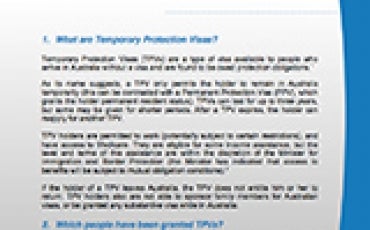Australia’s international obligations
Fact Sheet: Australia’s International Obligations
As a signatory to a number of international treaties, Australia is obliged to protect the human rights of all asylum seekers and refugees who arrive in Australia, regardless of how or where they arrive, and whether they arrive with or without a visa.
The 1948 Universal Declaration of Human Rights (UDHR)
The Universal Declaration of Human Rights was the first internationally agreed statement of fundamental human rights. It provides a foundation for other international instruments and is generally regarded as the standard by which to measure compliance with human rights.
The UDHR supports the right of all people to be able to seek asylum from persecution (Article 14).
The 1951 Convention Relating to the Status of Refugees (the Refugee Convention)
Article 1 of the Refugee Convention sets out the international legal definition of a refugee. A refugee is a person who has a well-founded fear of being persecuted for reasons of race, religion, nationality, membership of a particular social group or political opinion, is outside the country of their nationality and is unable or, owing to such fear, is unwilling to avail themselves of the protection of that country.
As a party to the Refugee Convention, Australia is bound to protect refugees in compliance with the Convention. Article 33 contains one of the key responsibilities agreed to is the principle of non-refoulement – that is, to ensure people who are found to be refugees are not sent back to a country where their life or freedom would be threatened.
Other important rights contained in the Refugee Convention include but are not limited to:
-
the right to non-discrimination (Article 3)
-
freedom of religion (Article 4)
-
the right to work (Article 17)
-
the right to housing (Article 21)
-
the right to not be penalised for illegal entry (Article 31)
The International Covenant on Civil and Political Rights (ICCPR)
The International Covenant on Civil and Political Rights contains a number of protections for refugees and asylum seekers. Every person has the right to life (Article 6). Article 9 of the ICCPR provides for the right to liberty and security of person and prohibits arbitrary detention.
Article 10 of the ICCPR also provides that, where a person is deprived of their liberty, they must be treated with humanity and dignity.
The Convention on the Rights of the Child (CRC)
The Convention on the Rights of the Child limits the detention of children and contains a number of important rights relevant to child refugees. This includes but is not limited to:
-
the obligation to make all decisions with regard to the best interests of the child (Article 3)
-
the right of children to protection, registration after birth and a nationality (Article 7)
-
the obligation not to separate children from their families (Article 9)
-
the obligation to protect children from all forms of violence or abuse (Article 19)
Another important right contained in the CRC is that to special protection and assistance for children who either are a refugee or are seeking refugee status (Article 22).
The Convention Against Torture and Other Cruel, Inhuman and Degrading Treatment or Punishment (CAT)
The Convention Against Torture provides that no one – including refugees and asylum seekers – shall be subject to torture or other cruel, inhuman or degrading treatment (Article 3). In addition, states are expressly prohibited from removing a person to a country where there are substantial grounds for believing that person would be in danger of being subject to torture.



